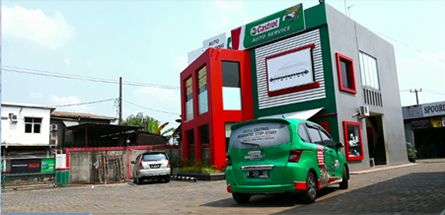Lubricant suppliers say branded workshops are critical in Indonesia’s aftermarket segment, which is growing as the country’s automobile parc ages and warranties expire.
Approximately 77 percent of Indonesias passenger vehicles – around 11 million units – will be out of warranty by 2020, according to Ipsos Business Consulting. The countrys aftermarket parts and services sales channel is expected to record a compound annual growth rate of 9.7 percent from 2015 to 2020.
Lubricant companies are increasingly targeting independent workshops as locations than can be converted into branded workshops, which are becoming more popular among consumers, said Hutomo Hadi Saputro, an associate consultant at Ipsos.
Owners of branded workshops agree to supply a majority of one suppliers products among several other brands. Pertamina Lubricants, for example, requires its products to make up 80 percent of its outlets offerings. Castrol workshops can only display Castrol products and marketing materials.
Its much easier to control and manage the quality offered by [branded] workshops, Hutomo said. Lube marketers standardize procedures and enhance the capability of mechanics, which later attract users to visit branded workshops instead of independent workshops.
Lube companies train mechanics at branded workshops and boost sales at those locations with branding and promotional activities. PT Federal Karyatama provides mechanics certification courses as well as financial backing for marketing efforts at some of its more than 3,300 workshops. Federal Oil Center shops for two-wheelers can be as small as 5 square meters, while its Super Federal Oil Center outlets must be a minimum of 30 square meters.
Castrol provides its workshops around Rupiah 80 million to 100 million (U.S. $6,000 to $8,000) worth of workshop equipment, renovations and branding support. This helps independent operators cover expenses to convert their workshops, which are mostly family-owned or small-scale businesses on small budgets. However, the rates and sales targets vary based on each workshops size and capability, Hutomo said. On average, a Castrol Auto Service shop must sell 40 to 50 24-liter cartons per month.
Photo: Castrol

Since launching branded workshops in Indonesia in 2004, Castrol has expanded its network of locations to around 500 Castrol Auto Service and 2,200 Castrol Bike Point shops, and says that it will continue proliferating its outlets. Castrol workshops provide brand loyalty programs, giving members Castrol experiences that money cant buy, such as the chance to watch Castrol Moto GP [events], participate in mechanic contests, attend an annual conference, and more, Mark BF Ng, head of marketing for BP Lubricants Asean region, told Lube Report Asia.
Gulf Oil International recently tied-up with 7-Eleven convenience stores, which are popular with the countrys motorcyclists, who collectively own around 76.2 million bikes. Gulf Oil is also considering collaborations with other chain stores, which would greatly increase its sales network.
Astra Otoparts is a good example of a large chain, as it has more than 300 Shop & Drive outlets and it recently launched Pit & Go workshops to cater to automobiles with outdated warranties.
State-owned Pertamina Lubricants said in its 2015 annual report that focusing on branded workshops development will help it expand its geographic footprint.
Branded workshops also help meet local consumers needs, according to a recent study on Indonesias consumer behavior conducted by American additive manufacturer Lubrizol Corp. Much work had to be done educating end users on the benefits of high-value lubricants, said Matthew Joyce, vice president of global sales at Lubrizol Additives.Seventy-nine percent of customers in the study had already made their decision on engine oil prior to arriving at the shop. Only 15 percent selected the correct lubricant for their vehicle.
Consumers show minimal willingness to learn about or try new brands, noted an August 2016 Ipsos report titled Indonesias Growing Automotive Aftermarket Landscape. They tend to remain loyal to trusted mechanics and brands.
In a survey of more than 400 out-of-warranty drivers in Indonesia, Ipsos found that mechanics directly influence consumers. Mechanics are true advocates for lubricants [brands], Ng said.The Indonesian lubricant consumer is largely a do-it-for-me consumer and hence depends mainly on mechanics recommendations.
Also, by selling directly to consumers through branded workshops, suppliers have an edge on counterfeit hawkers which are rampant in traditional market channels. The presence of genuine parts in branded aftermarket workshops is indeed increasing the competition between genuine and non-genuine parts, said Hutomo.